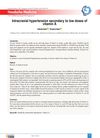 15 citations,
August 2019 in “Dermatologic Therapy”
15 citations,
August 2019 in “Dermatologic Therapy” Platelet-rich plasma (PRP) may help treat hair loss in patients with frontal fibrosing alopecia who don't respond to other treatments.
 30 citations,
September 2005 in “Best Practice & Research Clinical Rheumatology”
30 citations,
September 2005 in “Best Practice & Research Clinical Rheumatology” The document concludes that treating tough skin disease in lupus involves sun protection, steroids, antimalarials, and various other therapies chosen based on individual risks and benefits.
August 2021 in “BMJ Case Reports” A woman with lupus had blood cell destruction, treated successfully with medication.
 37 citations,
April 1979 in “The Journal of Clinical Pharmacology”
37 citations,
April 1979 in “The Journal of Clinical Pharmacology” Minoxidil effectively controls blood pressure but side effects may limit its use.
 May 2023 in “Australasian Journal of Dermatology”
May 2023 in “Australasian Journal of Dermatology” Various substances, including cosmetic sponges, vein glue, chai tea, skincare products, and medicaments, can cause allergic contact dermatitis, and healthcare workers often react to N95 masks.
 5 citations,
May 2019 in “Archives of Dermatological Research”
5 citations,
May 2019 in “Archives of Dermatological Research” Narrowband UVB treatment increases certain gene expressions in psoriasis skin and improves symptoms.
 November 2017 in “Elsevier eBooks”
November 2017 in “Elsevier eBooks” PCOS is a genetic disorder affecting women's reproductive health, with treatments focused on symptoms like insulin resistance and fertility.
 2 citations,
February 2023 in “BMC women's health”
2 citations,
February 2023 in “BMC women's health” Birth control pills change the activity of certain inflammation and blood clotting genes in women with PCOS.
 4 citations,
January 2012 in “Elsevier eBooks”
4 citations,
January 2012 in “Elsevier eBooks” The document concludes that various skin conditions have specific treatments, ranging from antihistamines for urticaria to surgery and medication for tumors and chronic skin diseases.
8 citations,
September 2005 in “Practical diabetes” PCOS is a condition causing irregular periods, excess male hormones, and infertility, often managed by targeting insulin resistance and specific symptoms.
 6 citations,
March 2014 in “Annals of Pharmacotherapy”
6 citations,
March 2014 in “Annals of Pharmacotherapy” A woman's hair loss was probably caused by the antifungal drug anidulafungin.
317 citations,
April 2018 in “Journal of steroid biochemistry and molecular biology/The Journal of steroid biochemistry and molecular biology” PCOS is a complex condition in women that can lead to health issues, and lifestyle changes are the best management approach.
40 citations,
July 2011 in “The journal of clinical hypertension” Hydralazine and minoxidil are blood pressure medications that relax blood vessels, with potential side effects like rapid heartbeat and fluid retention, and are used for severe or pregnancy-related hypertension.
 12 citations,
January 2010 in “Pediatric Health”
12 citations,
January 2010 in “Pediatric Health” Early treatment and lifestyle changes are important for managing PCOS in young people to prevent long-term health issues.
 119 citations,
January 2014 in “Indian Journal of Dermatology, Venereology and Leprology”
119 citations,
January 2014 in “Indian Journal of Dermatology, Venereology and Leprology” Platelet-rich plasma might help with hair growth and skin conditions, but more research is needed to prove its effectiveness and safety.
 August 1995 in “Journal of The European Academy of Dermatology and Venereology”
August 1995 in “Journal of The European Academy of Dermatology and Venereology” New therapy helps treat hair loss.
 August 1995 in “Journal of The European Academy of Dermatology and Venereology”
August 1995 in “Journal of The European Academy of Dermatology and Venereology” New therapy helps treat hair loss.
5 citations,
August 2022 in “Mediators of Inflammation” Combining Pulsed Dye Laser with Pingyangmycin is effective and safe for treating acne scars.
 September 2022 in “Research, Society and Development”
September 2022 in “Research, Society and Development” Long-lasting symptoms like fatigue and breathlessness can persist after COVID-19, requiring ongoing medical follow-up.
 October 2022 in “Deleted Journal”
October 2022 in “Deleted Journal” Long-term low-dose Vitamin A intake may cause increased brain pressure.
 February 1961 in “The Lancet”
February 1961 in “The Lancet” Some new drugs show potential for treating blood cancers but have serious side effects and need more research.
 December 2022 in “Cureus”
December 2022 in “Cureus” Low iron levels are linked to hair loss in women.
 February 2012 in “InTech eBooks”
February 2012 in “InTech eBooks” PCOS increases the risk of heart disease and type 2 diabetes in women.
 19 citations,
March 1990 in “Journal of Cardiovascular Pharmacology”
19 citations,
March 1990 in “Journal of Cardiovascular Pharmacology” Minoxidil affects rat fluid dynamics, altering pressure and circulation, improving blood flow and hair growth.
 38 citations,
February 2002 in “British journal of dermatology/British journal of dermatology, Supplement”
38 citations,
February 2002 in “British journal of dermatology/British journal of dermatology, Supplement” Two patients with porphyria cutanea tarda experienced their grey hair turning dark again.
 33 citations,
September 2012 in “Wound Repair and Regeneration”
33 citations,
September 2012 in “Wound Repair and Regeneration” Applying calreticulin can speed up wound healing in diabetics.
 151 citations,
May 2021 in “Frontiers in Medicine”
151 citations,
May 2021 in “Frontiers in Medicine” Many patients experience long-lasting symptoms like fatigue and pain after COVID-19, regardless of initial disease severity.
 55 citations,
October 1975 in “Circulation”
55 citations,
October 1975 in “Circulation” Minoxidil, propranolol, and furosemide effectively control severe hypertension, but may cause sodium retention.
8 citations,
November 2018 in “BMC Pulmonary Medicine” A 70-year-old woman with bronchiectasis developed a rare immune disease due to a bacterial infection, requiring a difficult balance of treatments.
 24 citations,
October 2017 in “Biomolecules”
24 citations,
October 2017 in “Biomolecules” Some growth factors, while important for normal body functions, can cause diseases when not regulated properly.
























